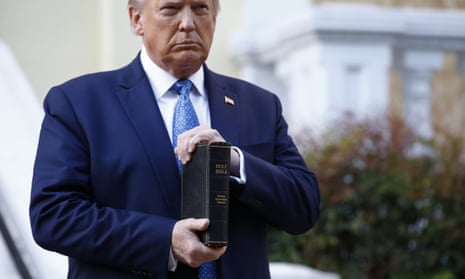No one accuses Donald Trump of subtlety. When the US president raised a Bible overhead on Monday evening outside St John’s Episcopal church in Washington DC, the sign was unmistakable: an appeal to his white evangelical base for loyalty, as protests and riots roared across America.
Not every Christian answered the call. The Rev Gini Gerbasi, an Episcopal priest, said police used teargas to drive her and others from St John’s before Trump’s appearance. “They turned holy ground into a battleground,” she told Religion News Service.
But many of Trump’s evangelical supporters, far from Washingtons political stage, saw the move as a victory in a world rife with evil.
“My whole family was flabbergasted,” said Benjamin Horbowy, 37.
The Horbowys had gathered in Tallahassee, Florida, to watch live as Trump walked from the White House to St John’s. “My mother just shouted out, ‘God give him strength! He’s doing a Jericho walk!’”
A Jericho walk, in some evangelical circles, refers to the biblical book of Joshua, where God commanded the Israelites to walk seven times around the opposing city of Jericho, whose walls then came crashing down.
Horbowy already supported Trump politically – he heads the local chapter of a pro- Trump motorcycle club and is campaigning for a seat in Florida’s state senate – but when Trump lifted the Bible, Horbowy and his family felt overcome spiritually.
“My mother started crying. She comes from Pentecostal background, and she started speaking in tongues. I haven’t heard her speak in tongues in years,” he said. “I thought, look at my president! He’s establishing the Lord’s kingdom in the world.”
Did he feel that conflicted with the Gospel of John, where Jesus said “my kingdom is not of this world”?
“Well,” Horbowy said, “that’s a philosophical question.”
After watching Trump’s gesture, Horbowy changed his Facebook profile photo to one of Trump outside St John’s, with added rays of light emanating from the Bible. “It was the coolest thing he could do. What more could he do, wear blue jeans and ride in on a horse?” he said.
The catalyst for the protests was the killing of 46-year-old George Floyd by Minneapolis police. Asked about that, Horbowy said, “There’s a Bible verse that says we shouldn’t talk about evil things. We can just say, ‘There’s evil’ and move on.”
He couldn’t remember the exact verse, he said.
So how did devotees like Horbowy become such a potent force that Trump would signal them in his hour of need? One answer lies in their relationship with Trump. They have given him their fervent support at the ballot box and in turn they have seen a conservative takeover of the courts and an assault on reproductive and LGBTQ+ rights.
Their power and worldview is a culmination of trends that started decades ago, according to John Fea, a history professor at Messiah College and himself an evangelical Christian. “It’s rooted in fear,” he said.
In the 1980s, Fea said, several forces converged to alarm white Christians: a removal of official prayer and Bible readings from schools, an influx of immigrants from Asia and the Middle East, and the final desegregation of schools like Bob Jones University.
“So came the emergence of the Christian right,” Fea said.
Figures like Jerry Falwell and James Dobson started wielding political influence in a new way, followed today by a new generation that includes Franklin Graham and the Dallas pastor Robert Jeffress, one of Trump’s leading evangelical defenders.
“What seems to be missing in much of the coverage is that a group of protesters had tried to burn that church to the ground 24 hours earlier,” Jeffress said.
Jeffress sees no conflict between Trump’s behavior and the Bible he held up on Monday evening. “You mean, does he pretend to be perfectly pious?” he said. “No.”
Fea calls faith leaders like Jeffress “court evangelicals”.
“Trump has these people around him,” Fea said. “They’re telling him, ‘You need to get your evangelical base on board.
People once concerned with piety, Fea said, now crave “an exercise in pure political power”, and the Bible is no longer a spiritual weapon but an earthly one.
When Trump describes himself as a “law and order” president and holds aloft a Bible, he conflates which law he will enforce, and whose order will follow. In a short speech before the walk to St John’s, Trump said he would “dominate the streets”. That is the “kingdom in the world” Horbowy referenced.
“I believe it’s like Ephesians 6:10 through 19,” Horbowy said from Florida. “I believe this is a president who wears the full armor of God.”
But one of those verses – verse 12 – says explicitly that “we do not wrestle against flesh and blood”, but against spiritual enemies.
“Well,” Horbowy said. “He’s fearless.”
